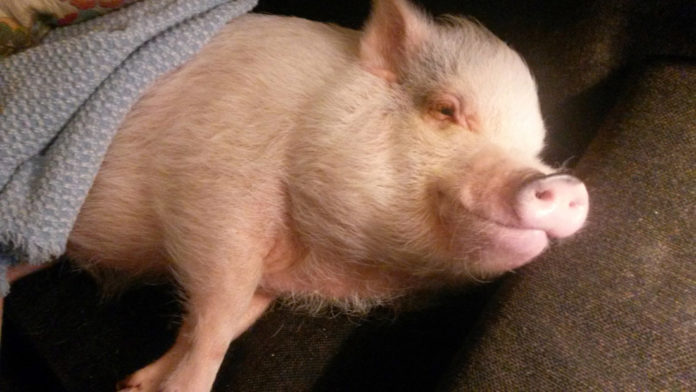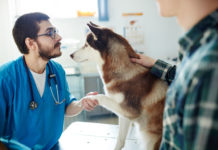For these Atlantans, love of pets goes beyond cats and dogs
Written by H.M. Cauley
A survey taken by the American Pet Products Manufacturer’s Association reveals what many Americans already knew: We are mad about pets. The number of households that include a creature tops 71 million. Leading the list, by sheer volume, are freshwater fish, followed by cats, dogs and birds.
But some Atlantans have stepped outside the bounds of that survey and own pets that didn’t make the top 10 list. Whether they’re drawn to the animal’s uniqueness, practicality, or in some cases, the physical workout it offers, they’re proud to share stories about their rather unusual pet choices.
As an example, look no farther than Yovy Gonzalez and his school-teacher spouse, Mike Dorsey. The Druid Hills couple and their two toddler boys consider their 18 chickens more than free-range pets. The two got the idea of having their own coop when they visited a friend 19 years ago and were fascinated with his hens.
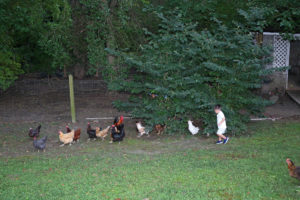 “We read about them then decided to start raising them,” says Gonzalez, a condo association manager. “We started out with six, and they were so much fun. We’d come home on Friday nights, let the chickens out and sit there with a beer and watch them. We did like the idea of the eggs — that was the main purpose — but it was also to do something different.”
“We read about them then decided to start raising them,” says Gonzalez, a condo association manager. “We started out with six, and they were so much fun. We’d come home on Friday nights, let the chickens out and sit there with a beer and watch them. We did like the idea of the eggs — that was the main purpose — but it was also to do something different.”
With southern-inspired names such a Bernice, Beulah and Minnie, the brood quickly got bigger as the guys learned more about different breeds. “We had some weird ones, like the d’Uccle that gives very small eggs the size of bird eggs,” says Gonzalez. “Now the mix we have gives us about six to eight eggs a day. We give them to the neighbors and make a lot of quiches.”
Acquiring those eggs is more expensive than picking up a dozen at Kroger. The care required to keep the birds healthy and safe is complex, as the couple learned when some of their original brood was attacked by a hawk — a loss that prompted them to build a backyard coop roughly 20 by 50 feet where the birds can spread out while still being protected by a grid of fishing line that keeps other critters out. The pine straw in the coop has to be thoroughly treated and culled for bugs. The straw must also be replaced at least twice year. The birds’ diet is largely organic feed with sunflower seeds, an ingredient that yield eggs with deep yellow yolks. But the couple has an acre of land that accommodates the pet coop.
“And we both love animals so much that if our lives were different, we’d probably have a little farm somewhere,” says Gonzalez.
Atlanta PR guru Liz Lapidus treks from Morningside to a farm in Cartersville to tend to her pet, a 17-year-old Draft Cross horse named Benjamin.
“These horses can live to be 30, and you’d think you get a horse and then at some age put it out to pasture,” she says. “But that’s not a thing for me; I’m a lifer, and it’s mine forever.”
Lapidus has loved horses since her childhood days growing up in Miami. “I had the bug from the minute I laid eyes on a horse,” she recalls. “I grew up riding, and even when I fell off, I couldn’t wait to get back on.”
When she came to Atlanta in the 1980s, she took riding lessons at the stables in Chastain Park, where she had the chance to buy her own horse. She boarded and rode it there for years until the animal died. “That was rough,” she says succinctly.
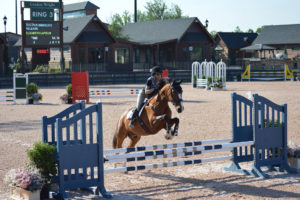 Now, Lapidus’ Benjamin resides at a facility with an indoor arena, pastures and stables. She makes the drive north three or four days a week to ride and prepare for events. “I’m still training and showing, and we’ve won some awards,” she says.
Now, Lapidus’ Benjamin resides at a facility with an indoor arena, pastures and stables. She makes the drive north three or four days a week to ride and prepare for events. “I’m still training and showing, and we’ve won some awards,” she says.
Keeping Benjamin in top form and in a comfortable home, as well as entering him in show events, comes at a cost, Lapidus admits. “But he’s my baby, so it’s a labor of love for sure. I definitely treat my horse better than I treat myself.”
Riding also requires Lapidus to keep in shape as well. “I’ve heard it said that jockeys are the strongest of any athlete for their size; it’s definitely a strengthening sport,” she says. “But there’s no age limit, and men and women compete together. I grew up with a professional rider who is now in her 60s and is still a top rider. That’s another thing I love about it.”
It took a bit of research and a seven hour journey to Florida for Alex Acton and his costumer wife, Leslie, to find their current pet, mini potbelly Rosie.
“We got a piglet in a dog crate, and she’s lived in our guest room ever since,” says Acton, a marketing exec in the health care industry who was coaxed into giving a pig a go by his wife. She grew up on a farm near Madison where her family kept 800-pound sows. “She always said pigs were her favorite animals because they were smart, social and engaging. I thought it was an unusual pet, but I wasn’t weirded out by it. I did veto calling her ‘Bacon,’ though.”
Now 7 years old and 70 pounds, Rosie was the Stone Mountain couple’s first pet and still provides a conversational ice breaker. “It’s my ‘interesting fact’ when I introduce myself to people,” says Acton. “It’s now normal to hear her grunting and realize, ‘Oh, yeah, there’s a pig in my house.’”
He’s also learned that while mini potbellies can live up to 20 years and get as big as 90 pounds, they’re rarely sick. “There’s not much that goes wrong with them,” Acton says. “We do have to watch her diet because, well, she eats like a pig, going for just about anything we let her have. She’s incredibly food motivated; you can teach pigs to sit and spin in circles, but it’s always about the treat.”
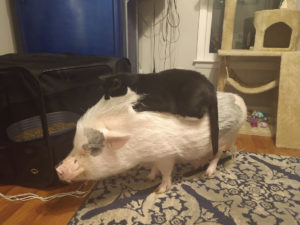
Rosie is fed pig food formulated for various life stages that’s supplemented with fresh produce. Breakfast is a salad of spinach, squash, zucchini and cucumbers. “She’ll also go for a banana that’s going brown or an apple that’s getting spotty,” says Acton. “Half of what we buy in the produce section is for the pig.”
While food prep may take longer, grooming does not. “We have to do some maintenance on her hooves, and her teeth will fall out, but they regrow,” says Acton. “As a breed, they’re pretty hardy, like little tanks, and easy to take care of.”
The couple’s pet spends most of her time in the guestroom, where she’ll snuffle into a pile of blankets and quilts to make a nest, but she also relishes exploring their flat backyard where she can bask in the sun and eat wild strawberries or acorns in the fall. Acton has tried walking Rosie on a leash but has found few that fit well. And the pig is spooked by loud noises such as cars’ backfiring that might set her off at a run. “Then the biggest issue is that at 70 pounds, she can easily pull you off your feet,” he says.
So Rosie remains indoors with the Actons’ second pet: a kitten named Calliope that the couple rescued from a restaurant parking lot. “The cat loves the pig, but the pig tolerates the cat,” says Acton. “The cat totally defers to the pig and will even groom her. They’re really cute together.”

